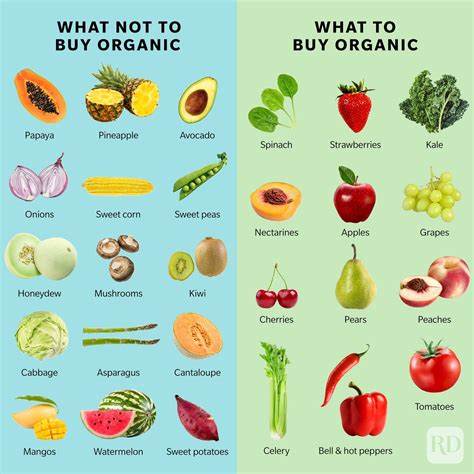How to Verify the Source of Organic Food: A Comprehensive Guide
What are the Different Organic Certifications?
Organic certifications are a crucial part of verifying the authenticity of organic food. They ensure that the products meet specific standards for organic farming, processing, and handling. Different organizations worldwide issue these certifications, each with its own set of requirements and regulations.
Here are some of the most common organic certifications:
- USDA Organic: This certification is issued by the United States Department of Agriculture and is one of the most recognized organic certifications in the world. It requires products to be produced without the use of synthetic pesticides, herbicides, fertilizers, or genetically modified organisms (GMOs).
- EU Organic: The European Union’s organic certification is another globally recognized standard. It follows strict guidelines for organic farming practices, including traceability, animal welfare, and environmental protection.
- JAS Organic: This certification is issued by the Japanese Agricultural Standards (JAS) and focuses on traditional Japanese farming methods and environmental sustainability.
- Canada Organic: The Canadian Organic Standards (COS) ensure that organic products meet the requirements for organic production, processing, and labeling.
- IFOAM Organic: The International Federation of Organic Agriculture Movements (IFOAM) provides a global framework for organic standards and accreditation. It ensures that certified products meet rigorous criteria for organic production and fair trade practices.
When looking for organic food, it’s essential to check the certification label. It should clearly indicate the name of the certifying organization and the certification standard used. By choosing certified organic products, you can be confident that they meet the highest standards for organic production.
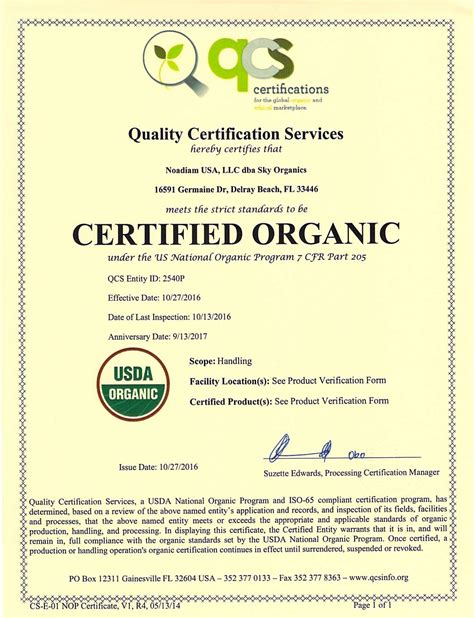
How Do I Know If a Food Label is Genuine?
Organic food labels are a valuable source of information for consumers, but it’s essential to know how to interpret them correctly. Look for the certification label, which should be clear, concise, and easy to understand. The label should also include the name of the certifying organization, the certification standard used, and the product’s organic content.
Here are some tips for verifying a food label’s authenticity:
- Check for certification logos: Organic labels should display the logo of a reputable certifying organization. Look for recognizable certifications like USDA Organic, EU Organic, or JAS Organic.
- Read the fine print: The label should include specific details about the product’s organic content and any other relevant information. For example, the USDA Organic seal indicates that at least 95% of the ingredients are organic.
- Look for the product’s origin: Organic certification programs usually include information about the product’s origin. This helps consumers trace the product’s journey from farm to table.
- Research the certifying organization: Verify that the certifying organization is recognized and credible. Check their website or contact them for further information about their standards and practices.
- Be wary of misleading claims: Some labels may use terms like «organic-style» or «all-natural» without meeting actual organic standards. Pay attention to the label’s wording and ensure it complies with official organic regulations.
By carefully examining the food label and researching the certification organization, you can ensure that you are purchasing authentic organic food. Remember, organic labels are a valuable tool for informed choices, but it’s essential to use them responsibly and be vigilant about misleading claims.
How Can I Find Out if a Farm Is Certified Organic?
Identifying certified organic farms can be a rewarding experience, allowing you to connect directly with producers and gain a deeper understanding of sustainable agriculture. To determine if a farm is certified organic, you can follow these steps:
- Visit the farm’s website: Most farms will clearly display their organic certification information on their website. Look for details about their certifications, such as the certifying organization and the standards they adhere to.
- Check for certification logos: If the farm has a physical presence, such as a farm store or market stall, look for certification logos displayed prominently. These logos should be recognizable and consistent with the information provided on their website.
- Contact the farm directly: If you cannot find certification information online or at the farm, contact the farm owner or manager directly. Inquire about their organic certification status and any relevant documentation.
- Consult a local directory or guide: Many regions have directories or guides listing certified organic farms. Search online or consult local farmers’ markets or agricultural organizations for these resources.
- Verify the farm’s certification with the issuing organization: Once you have identified a potential certified organic farm, you can contact the certifying organization directly to verify the farm’s status. Most organizations have public databases or registries that list certified farms.
By taking these steps, you can confidently identify certified organic farms and support their sustainable farming practices. Choosing organic products from certified farms contributes to a healthier environment, supports ethical production methods, and ensures the quality and integrity of your food choices.
What Are the Benefits of Buying Organic Food?
Organic food has gained significant popularity in recent years due to its potential benefits for health, the environment, and animal welfare. Buying organic food supports sustainable farming practices, reduces exposure to harmful chemicals, and contributes to a healthier planet. Here are some key benefits:
- Reduced Exposure to Pesticides and Herbicides: Organic farming prohibits the use of synthetic pesticides and herbicides, which can have detrimental effects on human health and the environment. Choosing organic food reduces your exposure to these harmful chemicals.
- Higher Nutritional Value: Some studies suggest that organic produce may have higher levels of certain nutrients, including antioxidants and vitamins. However, more research is needed to confirm these claims.
- Better for the Environment: Organic farming practices, such as crop rotation and composting, improve soil health and biodiversity. They also contribute to reducing greenhouse gas emissions and preserving natural resources.
- Improved Animal Welfare: Organic livestock production emphasizes humane treatment and prohibits the use of antibiotics and growth hormones. Animals raised organically have access to pasture and are treated with respect, resulting in a more ethical and sustainable food system.
- Supports Local Farmers and Sustainable Agriculture: Buying organic food from local farms helps to support sustainable agriculture and strengthens local economies. It also promotes the development of healthier food systems.
While organic food may come at a higher price, its benefits for health, the environment, and animal welfare make it a worthwhile investment. By choosing organic products, you contribute to a more sustainable and ethical food system, supporting local farmers and promoting a healthier planet.
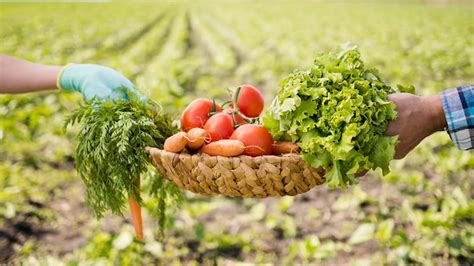
How Do I Know What to Trust When Buying Organic Food Online?
Shopping for organic food online offers convenience and access to a wider selection of products, but it also presents unique challenges for verifying the authenticity of goods. When buying organic food online, trust is paramount. Here are some tips to ensure you’re making informed and reliable choices:
- Look for reputable retailers: Choose online retailers known for their commitment to organic standards and quality control. Research their certifications and customer reviews to ensure their reliability.
- Verify certification labels: Check the product descriptions and images for organic certification logos. Ensure the labels are clear, concise, and from recognized certifying organizations.
- Read customer reviews: Reviews from previous customers can provide valuable insights into the quality, freshness, and authenticity of organic products sold by a particular retailer. Look for reviews highlighting certification details or experiences with product quality.
- Contact the retailer for clarification: If you have any doubts or questions about the authenticity of a product, contact the retailer directly. Inquire about their sourcing practices, certification procedures, and any relevant documentation.
- Be wary of suspiciously low prices: Organic food is often priced higher due to its production costs and regulations. Be cautious of online retailers offering extremely low prices for organic products, as this could be a sign of questionable authenticity or quality.
By following these guidelines, you can navigate the world of online organic food shopping with confidence. Trust reputable retailers, verify certification labels, and engage with customer reviews to make informed and reliable choices for your organic purchases.
What Are the Different Organic Labeling Requirements?
Organic labeling requirements vary depending on the region or country. However, most organic labels share common elements, including the certification logo, the product’s organic content, and any other relevant information about its production and sourcing.
Here’s a table summarizing the key organic labeling requirements in the United States, the European Union, and Japan:
| Region | Certification Logo | Organic Content Requirement | Additional Labeling Requirements |
|---|---|---|---|
| United States (USDA Organic) | 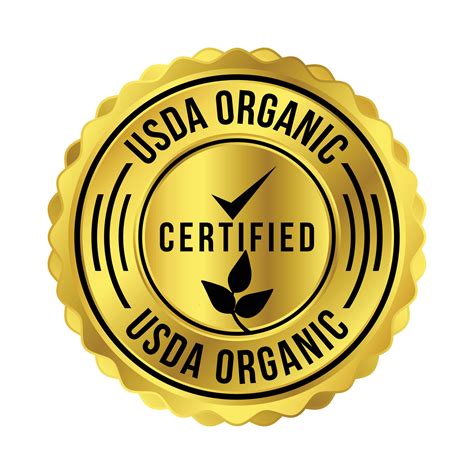 |
At least 95% of ingredients must be organic. | Must include the words «USDA Organic» and the certification logo. |
| European Union (EU Organic) |  |
At least 95% of ingredients must be organic. | Must include the EU Organic logo and the words «Organic» or «Bio» in the official language of the country. |
| Japan (JAS Organic) | 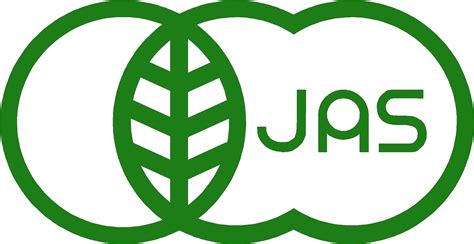 |
At least 95% of ingredients must be organic. | Must include the JAS Organic logo and the words «Organic» or «Bio» in Japanese. |
It’s important to remember that these are just some of the common requirements. Each certifying organization may have its own specific rules and regulations, so it’s always best to check the individual certification’s website for complete details.
Can I Grow My Own Organic Food?
Growing your own organic food is a rewarding and empowering way to control the quality and origin of your food. It allows you to connect with nature, learn about sustainable agriculture, and enjoy the satisfaction of nurturing your own food. To grow your own organic food, you can follow these steps:
- Choose the right location: Select a sunny spot with well-drained soil. Consider the amount of space you have available and the types of crops you want to grow.
- Prepare the soil: Amend the soil with organic matter, such as compost or manure, to improve its fertility and structure. Test the soil pH and adjust it if necessary.
- Choose organic seeds: Opt for organic seeds from reputable suppliers. Ensure they are certified organic to avoid contamination from non-organic sources.
- Follow organic growing practices: Avoid using synthetic pesticides, herbicides, or fertilizers. Use natural methods for pest control and weed management, such as companion planting, beneficial insects, and hand weeding.
- Practice crop rotation: Rotate crops each season to improve soil health, control pests, and prevent disease buildup.
- Harvest and enjoy: Once your crops are mature, harvest them at their peak ripeness. Enjoy the fruits (or vegetables) of your labor and share your bounty with others.
Growing your own organic food can be a rewarding experience, but it takes dedication and effort. Remember to research organic growing practices, use certified organic seeds, and avoid using synthetic chemicals to ensure your food meets the highest organic standards. With a little time and effort, you can enjoy the delicious and wholesome benefits of homegrown organic produce.
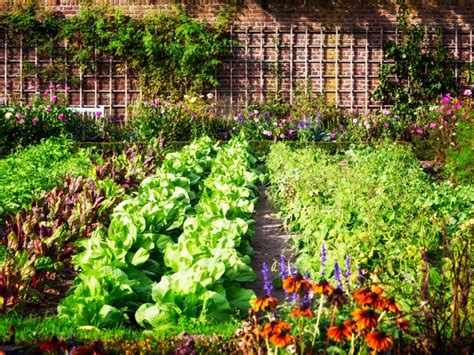
Is There an Organic Certification for Meat?
Yes, there are organic certifications specifically for meat. These certifications ensure that livestock are raised according to strict organic standards, including humane treatment, access to pasture, and a prohibition on antibiotics and growth hormones.
For example, the USDA Organic certification applies to meat as well. Organic meat must come from animals that were raised without the use of antibiotics, growth hormones, or pesticides. They must also have access to pasture and be fed organic feed. Other organic certifications for meat include:
- EU Organic
- JAS Organic
- Canada Organic
- IFOAM Organic
When buying organic meat, look for the certification label, which should include the name of the certifying organization and the certification standard used. The label may also indicate the animal’s breed, the farm’s location, and any other relevant information about its production. By choosing certified organic meat, you can be confident that you are consuming meat from animals that were raised humanely and sustainably.
What Does «100% Organic» Mean?
«100% Organic» on a food label signifies that all ingredients in the product are certified organic. This means that the product was produced and processed according to strict organic standards, without the use of synthetic pesticides, herbicides, fertilizers, or genetically modified organisms (GMOs).
The term «100% Organic» is regulated by certifying organizations, ensuring that it is used correctly and accurately reflects the product’s organic content. When you see «100% Organic» on a label, you can be assured that the product is free from any non-organic ingredients and meets the highest standards for organic production.
Is «Organic» the Same as «Natural»?
No, «organic» and «natural» are not interchangeable terms. «Organic» refers to a specific set of regulations and standards that govern agricultural practices, including the use of synthetic pesticides, herbicides, fertilizers, and GMOs. «Natural,» on the other hand, is a broader term that does not have specific guidelines or regulations.
A product labeled «natural» may not necessarily meet organic standards. It may contain synthetic ingredients or be produced using conventional farming methods. Therefore, it’s important to look for the «organic» certification logo to ensure that the product is truly organic and complies with official organic standards.
Where Can I Buy Certified Organic Food?
Certified organic food is becoming increasingly available in various locations, making it easier than ever to make informed and sustainable choices. You can find certified organic food at:
- Farmers’ markets: Local farmers’ markets often feature a wide selection of organic produce, meat, and other products directly from the farm.
- Grocery stores: Many grocery stores now have dedicated sections for organic food, including produce, dairy, meat, and packaged goods.
- Health food stores: Specialty health food stores often carry a wider variety of organic products, including organic supplements, personal care items, and bulk foods.
- Online retailers: Online retailers offer convenience and access to a wider selection of organic products, including produce, groceries, and prepared meals.
When choosing where to buy certified organic food, consider factors like price, convenience, product selection, and the retailer’s commitment to organic standards and quality control. Remember, choosing certified organic food supports sustainable agriculture, reduces exposure to harmful chemicals, and contributes to a healthier planet.
## FAQ
What is the difference between «organic» and «conventional» food?
What is the difference between «organic» and «conventional» food?
Organic food is produced using methods that avoid the use of synthetic pesticides, herbicides, fertilizers, and genetically modified organisms (GMOs). Conventional food, on the other hand, may utilize these substances in its production. Organic farming practices emphasize sustainability, environmental protection, and animal welfare, while conventional farming methods often prioritize higher yields and lower costs.
Are organic foods always healthier?
Are organic foods always healthier?
While organic foods may offer potential health benefits, such as reduced exposure to harmful chemicals and higher levels of certain nutrients, it’s not conclusive that they are always healthier. More research is needed to determine the extent of these benefits. Ultimately, the health benefits of organic food depend on individual factors, dietary habits, and overall lifestyle choices.
Are organic foods more expensive?
Are organic foods more expensive?
Organic food is generally priced higher than conventional food due to its production costs, which include adhering to strict organic standards, using natural methods for pest and weed control, and investing in sustainable practices. However, the cost of organic food varies depending on factors like the product, seasonality, and location.
Can organic food be contaminated?
Can organic food be contaminated?
Yes, organic food can still be contaminated, even if it’s produced according to organic standards. Contamination can occur through various factors, including exposure to environmental pollutants, cross-contamination with non-organic products, or improper handling and processing. However, organic certifications aim to minimize these risks by ensuring adherence to strict regulations and practices.
How can I support organic farmers?
How can I support organic farmers?
Supporting organic farmers is essential for promoting sustainable agriculture and ensuring the availability of healthy, ethically produced food. You can support organic farmers by purchasing their products at farmers’ markets, grocery stores, and online retailers. You can also volunteer at local farms, participate in community gardening initiatives, and advocate for policies that support organic agriculture.
Is organic food always better for the environment?
Is organic food always better for the environment?
Generally, organic farming practices have a lower environmental impact than conventional farming methods. However, the environmental impact of organic food can vary depending on factors like the specific crops grown, farming methods employed, and the transportation distances involved. It’s important to consider the entire production cycle, from farm to table, when evaluating the environmental sustainability of organic food.
What are some examples of organic food products?
What are some examples of organic food products?
A wide range of food products can be certified organic, including fruits, vegetables, grains, dairy products, meat, poultry, eggs, and processed foods. You can find organic versions of most common food items, from fresh produce to packaged snacks and beverages.
Summary Table
| Question | Answer |
|---|---|
| What are the different organic certifications? | Organic certifications ensure that products meet specific standards for organic farming. Common certifications include USDA Organic, EU Organic, JAS Organic, Canada Organic, and IFOAM Organic. |
| How do I know if a food label is genuine? | Look for the certification logo, read the fine print, verify the product’s origin, research the certifying organization, and be wary of misleading claims. |
| How can I find out if a farm is certified organic? | Visit the farm’s website, check for certification logos, contact the farm directly, consult local directories, and verify the farm’s certification with the issuing organization. |
| What are the benefits of buying organic food? | Reduced exposure to pesticides, higher nutritional value, better for the environment, improved animal welfare, and support for local farmers. |
| How do I know what to trust when buying organic food online? | Look for reputable retailers, verify certification labels, read customer reviews, contact the retailer for clarification, and be wary of suspiciously low prices. |
| What are the different organic labeling requirements? | Organic labeling requirements vary by region but often include the certification logo, organic content requirement, and additional labeling details. |
| Can I grow my own organic food? | Yes, follow organic growing practices like using certified organic seeds, avoiding synthetic chemicals, and practicing crop rotation. |
| Is there an organic certification for meat? | Yes, certifications like USDA Organic ensure that livestock are raised humanely and sustainably. |
| What does «100% Organic» mean? | It signifies that all ingredients in the product are certified organic. |
| Is «Organic» the same as «Natural»? | No, «organic» has specific regulations while «natural» does not. |
| Where can I buy certified organic food? | At farmers’ markets, grocery stores, health food stores, and online retailers. |
